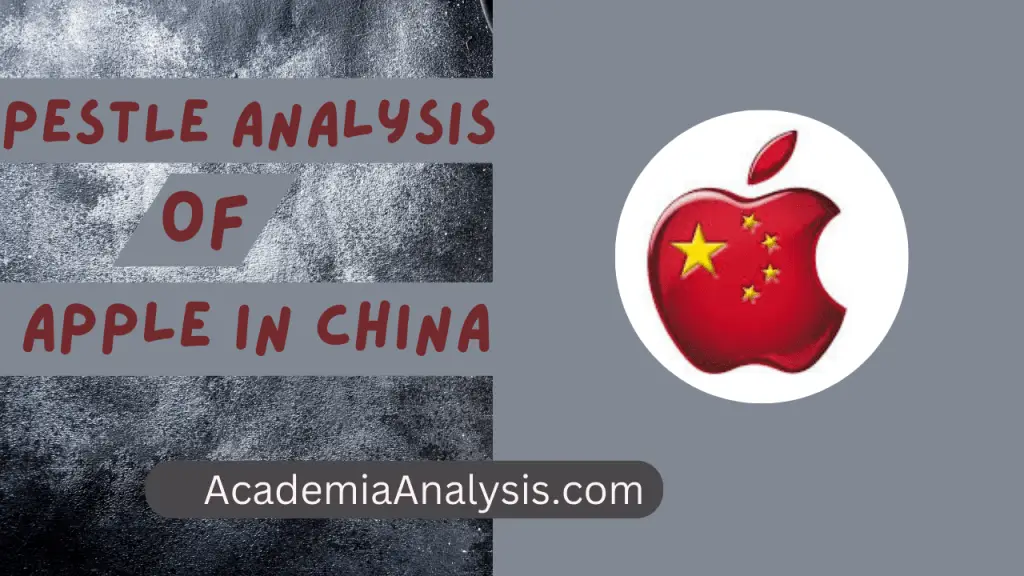Apple is a multinational technology company based in Cupertino, California, has had a significant presence in China since the early 2000s. With a growing middle class and a large, tech-savvy population. China has become one of the largest markets for Apple products, including the iPhone, iPad, and Mac.
Apple has also established a number of retail stores and a growing network of authorized resellers throughout the country. Despite some challenges, including intense competition from local tech firms and tensions with the Chinese government, Apple continues to expand its operations in China and remains one of the most recognizable and popular technology brands in the country.
Political Factors
The political factors affecting Apple in China include government regulations, intellectual property protection, and geopolitical tensions between China and the United States. Apple has had to navigate a complex regulatory environment in China, including strict censorship laws, data privacy concerns, and the country’s push for self-reliance in technology.
There have been concerns about the security of user data on Apple’s products and the company’s compliance with Chinese laws. Geopolitical tensions between China and the US, such as trade tensions and the ongoing “tech war,” have also had an impact on Apple’s business in the country.
Economic Factors
Apple Inc. has faced various economic challenges in China:
Increased competition: Apple faces intense competition from local smartphone manufacturers such as Huawei, Xiaomi, and Oppo, who offer similar products at lower prices.
Economic slowdown: The Chinese economy has slowed down in recent years, resulting in a decline in consumer spending.
Tariffs: The trade tensions between the US and China have resulted in increased tariffs on imported goods, making Apple’s products more expensive for Chinese consumers.
Currency fluctuations: The fluctuation of the Chinese yuan against the US dollar has affected the price of Apple’s products in China.
Despite these challenges, Apple still has a strong presence in China and continues to grow its business there.
Apple had to adjust its strategy to accommodate the changing economic landscape in the country.
Social Factors
The social factors affecting Apple’s presence in China include:
Demographics: China has a large and growing middle class, which is a key target market for Apple’s high-end products.
Culture: Chinese consumers place a high value on technology and brand reputation, which has helped to make Apple a popular brand in the country.
Government regulations: The Chinese government has strict regulations for technology companies operating in the country, including requirements for data storage and censorship. Apple has faced challenges in complying with these regulations.
Competition: Apple faces intense competition from domestic Chinese smartphone manufacturers such as Huawei and Xiaomi, which offer products at lower prices.
Economic environment: The Chinese economy has slowed down in recent years, affecting consumer spending and potentially impacting sales for Apple.
Overall, these social factors present both opportunities and challenges for Apple in China, and the company will need to carefully navigate these issues to succeed in the market.
Technology Factors
Some key technology factors related to Apple in China include:
Manufacturing presence: Apple has a significant manufacturing presence in China, with a majority of its products being manufactured by Chinese companies such as Foxconn and Pegatron.
Supply chain management: Apple has a complex and sophisticated supply chain management system in China, which helps it to efficiently source components and manufacture its products.
Local market adaptation: Apple has adapted its technology and products to suit the preferences and needs of the Chinese market, such as offering localized software and services.
Competition: Apple faces intense competition from local technology companies such as Huawei, Xiaomi, and Oppo in the Chinese market, which has pushed it to constantly innovate and improve its products.
Government regulations: The Chinese government has strict regulations regarding technology and intellectual property which affects Apple’s operations in the china.
Privacy and security concerns: There are growing concerns about privacy and security in China, particularly with regards to data protection and the use of Chinese technology. This could have implications for Apple and its products in the country.
Legal Factors
Intellectual property laws – Apple has faced challenges in protecting its intellectual property in China, including trademark infringement and counterfeit products.
Regulations and standards – China has specific regulations and standards that apply to the technology and electronics industry, which Apple must comply with.
Labor laws – Apple has faced criticism over working conditions in its Chinese manufacturing facilities and must comply with China’s labor laws.
Tax laws – Apple must abide by China’s tax laws, including taxes on imports and exports and corporate taxes.
Foreign investment restrictions – China has restrictions on foreign investment, particularly in the technology sector, which Apple must navigate.
Data privacy and security laws – Apple must comply with China’s data privacy and security laws, including data localization requirements.
These are some of the key legal factors that impact Apple’s operations in China.
Environmental Factors
There are several environmental factors affecting Apple’s operations in China:
Pollution: China is known for its high levels of air, water, and soil pollution. Which can impact the health of workers and local communities.
Labor standards: Apple has faced criticism over labor practices at its suppliers’ factories in China, including long working hours, low wages, and poor working conditions.
Natural resources: Apple’s production in China requires the use of natural resources, including minerals and energy. This can contribute to environmental degradation.
E-waste: With the fast pace of technological advancement, there is a growing concern over electronic waste (e-waste) in China. It can be harmful to the environment and human health.
Climate change: Climate change is having a significant impact on China, including rising temperatures, sea levels, and weather patterns that can affect Apple’s supply chain and operations.
These environmental factors pose significant challenges for Apple in China and the company is working to address them through its environmental initiatives and sustainability programs.
Also, read here: Pestle analysis of Walmart in China.





